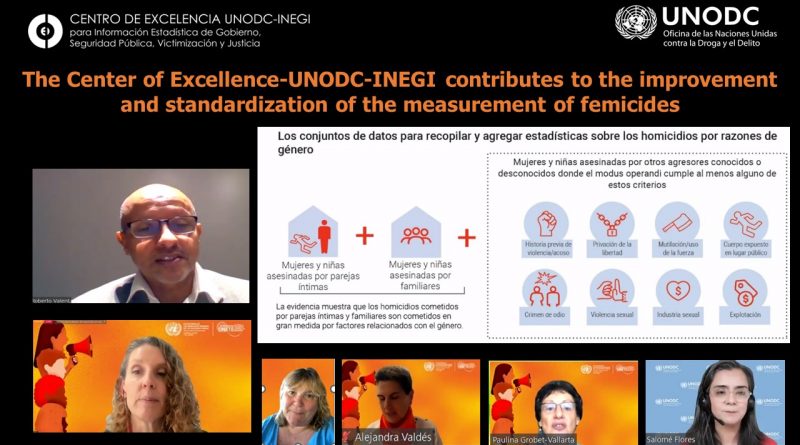The Center of Excellence-UNODC-INEGI contributes to the improvement and standardization of the measurement of femicides
December 9, 2022. As part of the “16 Days of Activism against Gender-Based Violence”, Issue-Based Coalition Crime and Violence of the Regional Collaborative Platform (RCP) for Latin America and the Caribbean, the UNODC-INEGI Center of Excellence (CoE) and the UN Woman-Global Centre of Excellence on Gender Statistics, presented the Statistical framework for measuring the gender-related killing of women and girls (also referred to as “femicide/ feminicide”), elaborated jointly and approved by United Nations Statistical Commission last March in the 53° Session.
During the opening remarks Roberto Valent, Regional Director of the UN Development Coordination Office for Latin America and the Caribbean, highlighted that this statistical framework is a wonderful example of articulation, collaboration, and synergy between agencies, in line with the 2030 Sustainable Development Agenda (SDG 5, target 5.2 and SDG 16, target 16.1) and the United Nations reform that aims support Member States in a collective way of serving the people in the most effective and efficient way as possible.
María-Noel Vaeza, Regional Director of UN Women for Latin America and the Caribbean, stood out the importance of spaces such as the Platform and the thematic coalitions that contributes to articulation. She mentioned that, according to surveys on gender violence, 1 in 10 women and/or girls had experienced some violence situation in their lives.
Candice Welsch, Regional Representative of UNODC for the Andean Region and Southern Cone, stressed that this statistical framework is a tool that seeks to overcome the existing limitations in the countries regarding the collection and disaggregation of data on the murders of women and girls for gender related reasons, and that it will contribute to have better and more completed statistics comparable at national and international level. This is essential, especially considering that, according to the recent report prepared by UNODC and UN Women, among the 81,000 women and girls killed intentionally globally in 2021, roughly four in ten have no contextual information to allow them to be identified and counted as gender-related killings (femicide/feminicide). This report also alerts us about the gender dimension in homicides, showing that in the 56 percent of homicides committed by intimate partners or other family members, the victim was a woman or a girl while only 11 percent of all male homicides are perpetrated in the private sphere.
Finalizing the opening remarks, Alejandra Valdés, Researcher of the ECLAC Division for Gender Affairs, recognized the incidence of civil society and women activists in stablishing the issues of gender violence and femicides in the region, the expansion of human rights, the assistance to women and public policies. In reference to the statistical framework, she highlighted its incidence at global level due the heterogeneity there is among countries and regions. In the case of LAC, the ECLAC Observatory for Gender Equality has been collecting data from the countries on many variables considered in the statistical framework and in line with the International Classification of Crime for Statistical Purposes.
The “Statistical framework for measuring the gender-related killing of women and girls” was presented by the Coordinators of both Centers of Excellence, Paulina Grobet from CEEG and Salomé Flores from CoE, who talked about the necessity to have a framework that measure gender related motivation in homicides of women and girls, the mandate received to elaborate it, and the global consultation process done (about 67 governmental institutions and civil society from 55 countries) that inquired about the validity, relevance and feasibility of the variables to be considered. Both Centers of Excellence are disseminating the framework at global, regional, and national level and they will implement a pilot in voluntary countries in the 5 continents to later develop technical guidelines y trainings, and they will give technical assistance to the relevant institutions to improve their homicide records. In 2025, UNODC will report the results of this work to the United Nations Statistical Commission. The framework is available in Spanish, French, English, Portuguese and Russian.
In the following presentation, Alejandra Valdés talked about the progress done in the region on violence against women and girls in the last 30 years, highlighting that 17 countries have criminalized the crime of femicide, and 10 countries have regulations about VAWG data and information; although the challenges of women´s access to justice and the capacity of justice administration systems to act with a gender and intersectionality perspective persist.
Finally, Eugenia D´Angelo from Mundo Sur presented the initiative “Femi(ni)dicios bajo la lupa en América Latina y el Caribe” started in March 2020, that seeks to improve civil society´s femicide data and statistics. She shared the creation of the “Plataforma derechos humanos bajo la lupa” which is available for civil society to standardize the monitoring. She explained that in a collaborative way a matrix for gathering information and definitions was built. Little by little, they are adding variables for analysis and the objective is to get closer to the statistical framework.
Visit UN Woman LAC Facebook to view the recording of the webinar.
Link of interest: Information about the elaboration process of the statistical framework



